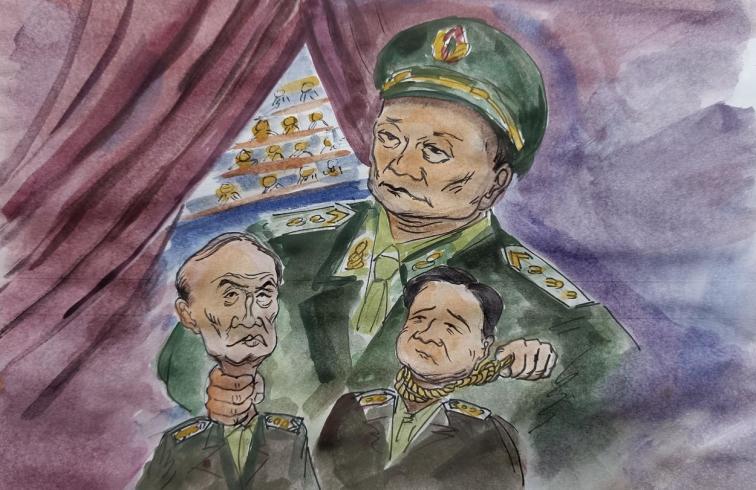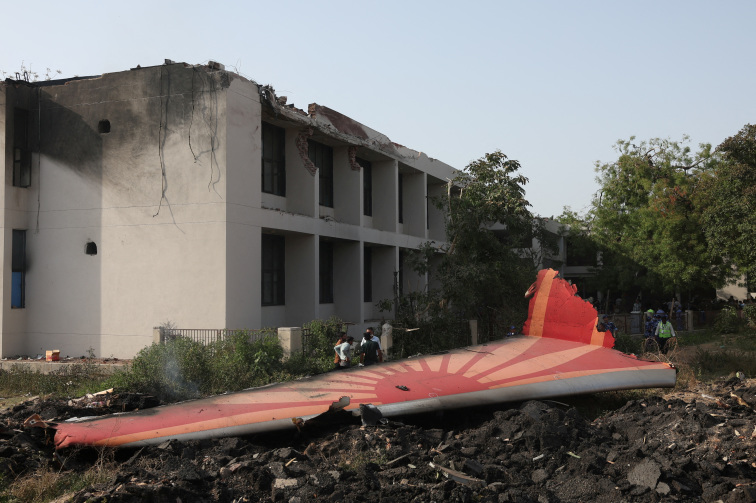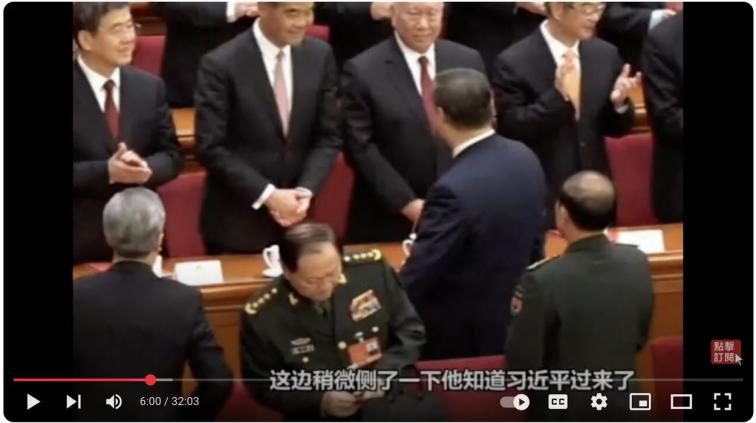Xi Jinping's greatest concern is protecting his family. (People News)
— Xi Jinping Attends Chen Yun’s Birthday Commemoration, Softens Stance to Save His Life
[People News] The current power transition within Zhongnanhai is not the result of a proactive historical choice but rather a desperate act of self-preservation by the regime. Whether through sabre-rattling or political bloodshed, internal strife can be ruthless, while externally, unity must be presented. The Party’s façade must be uniformly upheld.
On June 13, the CCP held a symposium at the Great Hall of the People in Beijing to commemorate the 120th anniversary of Chen Yun’s birth. Xi Jinping attended with all six other Politburo Standing Committee members and delivered a major speech. CCTV footage showed that, in addition to the seven Standing Committee members on stage, six other officials were also present: Shi Taifeng, Li Shulei, Zhang Youxia, Li Ganjie, Li Hongzhong, among others.
Among them, only Zhang Youxia wore a military uniform and sat upright, clearly serving as the military monitor of the event. At the 2024 symposium for Deng Xiaoping’s 120th birthday, the military was represented by Miao Hua. Miao Hua has since been officially purged; in late April 2025, he was stripped of his National People’s Congress delegate status, and his fate remains unknown. Another of Xi’s military loyalists, He Weidong, is rumoured to be dead. Additional reports suggest that Miao Hua, He Weidong, He Hongjun, and Xu Qiliang were all purged in one fell swoop by Zhang Youxia for their involvement in a failed coup launched by Xi Jinping. With Zhang now holding sole military power, his presence at Chen Yun’s birthday commemoration carries a strong implication of overseeing and supervising.
In the front row below the rostrum sat Hu Chunhua, Wang Xiaohong, Chen Yixin, Li Tieying, Gong Zheng, Sun Xinyang, and other current and former political figures—all with blank expressions and vacant eyes. Chen Yun’s children—Chen Yuan, Chen Weili, Chen Fang, Chen Weihua, and Chen Weilan—were also present. So were Red Second Generation figures like Mao Xinyu, Liu Yuan, Zhou Bingde, Zhu Heping, Ren Yuanfang, Chen Haosu, and Tao Siliang. They all looked sombre and dispirited. Xi Jinping’s power has become a past tense in everything but official announcements. These attendees were clearly not there to support Xi, but rather were actors in a political drama directed by the new central leadership.
Unusually, the commemoration was chaired by NPC Chairman Zhao Leji. In contrast, the 2024 Deng Xiaoping commemoration was hosted by Cai Qi. Zhao Leji is an elder of the Jiang Zemin faction and is known to be at odds with Xi Jinping. At this year’s “Two Sessions,” Zhao openly clashed with Xi. Cai Qi’s recent political stance has also drawn attention, with signs of distancing himself from Xi in several appearances amid Xi’s waning grip on power.
Compared with the 2024 Deng Xiaoping commemoration, the Chen Yun event was notably downgraded in terms of rank. Last year, Vice President Han Zheng attended Deng’s commemoration; this year, Han was absent. Last year, Sichuan Party Secretary Wang Xiaohui spoke on behalf of Deng’s hometown. This year, for Chen Yun, the speaker from Shanghai was Deputy Mayor Gong Zheng rather than Party Secretary Chen Jining. Propaganda efforts were also much weaker this year than for Deng’s commemoration last year.
During Deng Xiaoping’s era, Chen Yun was arguably the most powerful Party figure after Deng. The current system of political aristocracy and hereditary power in the CCP was largely shaped by Chen Yun. His political line preserved the Party's hereditary, bloodline-based elite system.
Chen Yun left behind four "testaments": 1.“The Chinese are easy to govern; they won’t rebel even if they starve.” 2. “Don’t start killing in internal Party struggles, or future generations won’t be able to face each other.” 3. “Power should be handed to our children; otherwise, our graves will be dug up.” 4. “We cannot implement a press law. Chiang Kai-shek had a decent press law, but we exploited a loophole and drove him to Taiwan. Our Party must control the press!”
These four instructions became the CCP's sacred principles for rejecting democracy and preserving authoritarian rule. Chen Yun also said, “It seems only our children are trustworthy—they won’t dig up their ancestors’ graves.” He continued, “Since we fought for this country, its inheritance should go to our descendants.” He further proposed that every high-ranking CCP family should have at least one child in political power while the rest “go into business” to amass wealth—an idea that Deng Xiaoping endorsed.
From November 1980 to January 1981, the Politburo held special sessions to discuss sentencing Jiang Qing. Deng Xiaoping advocated for the death penalty. Chen Yun opposed: “We must not kill her. The struggle with the Gang of Four was an internal Party affair. Intra-Party conflict should not result in executions, or future generations will find it hard to cope.” He added, “I firmly oppose using the death penalty in factional struggles. If you insist, Xiaoping, please record in the meeting notes: ‘Chen Yun disagrees.’ We must answer to history and to future generations!” Due to Chen’s stance, the list of defendants in the trial of the Lin Biao and Jiang Qing group was reduced from over 100 people to just ten principal figures.
Frankly speaking, Xi Jinping’s rise to power was directly or indirectly enabled by Chen Yun’s political line. Xi, as a Red Second Generation, met Chen Yun’s criteria for leadership. Jiang Zemin, whose ascent was orchestrated by Chen Yun, later chose Xi as his successor.
On June 13, Xi Jinping gave a keynote speech at the commemoration, stating: “Chen Yun played a crucial role in breaking the ideological shackles of the ‘Two Whatevers’ and in realising a great historical transition. At critical historical junctures, he firmly supported Comrade Deng Xiaoping’s push for reform and opening up, staunchly upheld Deng’s core leadership status and the authority of the Central Committee. He actively promoted rectification of past wrongs and wrongful convictions, contributed key insights to the resolution of major historical issues since the Party’s founding, and supported Deng’s correct stance on scientifically assessing Mao Zedong’s historical role and developing Mao Zedong Thought…”
Over the past decade, Xi has reinstated a lifelong presidency and Party dictatorship, rejected Deng’s reform and opening policies, revived Maoist radicalism, reversed historical progress, and launched wolf-warrior diplomacy. He unleashed Stalin-style purges within the Party, established absolute personal authority, allowed Cai Qi and the Xi faction to dominate everything, and pushed “Xi Jinping Thought” to absurd levels of ideological saturation, surpassing even Hua Guofeng’s “Two Whatevers.” This has wrecked politics, ruined foreign relations, shattered the economy and people’s livelihoods, and destabilised society, shaking the confidence of the Party, the military, and the public.
Now, Xi’s power has been systematically curtailed and stripped by Party elders and the military. Reports indicate that a new central leadership has formed and is now effectively governing China. Further revelations suggest that Xi’s former subordinate, Chen Min’er, secretly reported to Wen Jiabao that Xi had plotted against 15 Party elders at the 20th Party Congress. On June 13, a whistleblower submitted an open letter to People’s Report, detailing Xi’s orchestration of Li Keqiang’s murder. Xi is now doomed to be forever nailed to the pillar of historical shame.
If removed from power, Xi will certainly face a reckoning. The PLA Daily has recently published eight articles, all with veiled or open criticisms aimed at Xi—and even directly targeting the Xi-Peng Liyuan duo. At this critical, life-threatening juncture, Xi suddenly chose to praise Deng while criticising Mao on the occasion of Chen Yun’s birthday—a deeply symbolic act. The underlying message was a plea for mercy to the new central leadership—a signal of surrender, begging the anti-Xi forces not to carry out a purge. Combined with the recent public appearance where Xi dined with Belarusian President Lukashenko, accompanied by Peng Liyuan and Xi Mingze, the scene resembled a farewell or legacy-passing moment. This appeal via Chen Yun's legacy—“Intra-Party struggle must not involve killing, or future generations will be in trouble”—genuinely feels like Xi kneeling and begging for his life. △
(First published by People News)











News magazine bootstrap themes!
I like this themes, fast loading and look profesional
Thank you Carlos!
You're welcome!
Please support me with give positive rating!
Yes Sure!